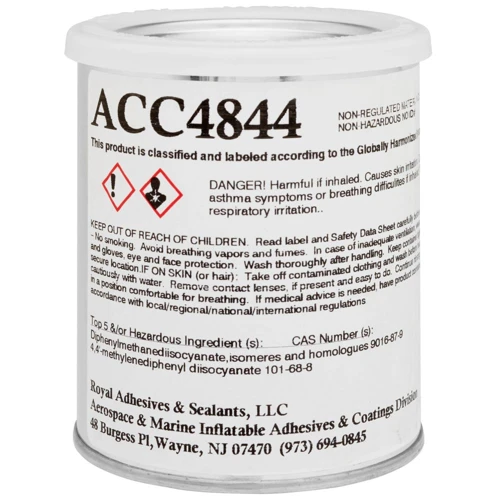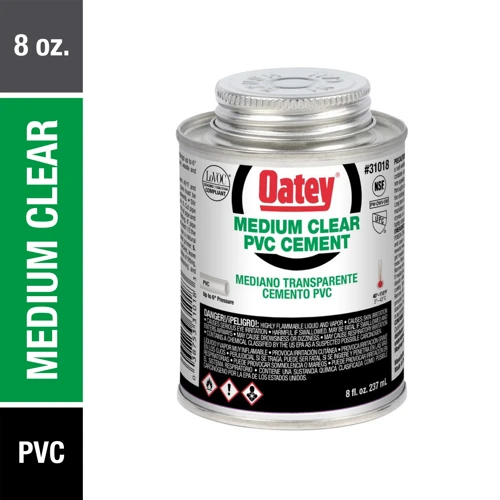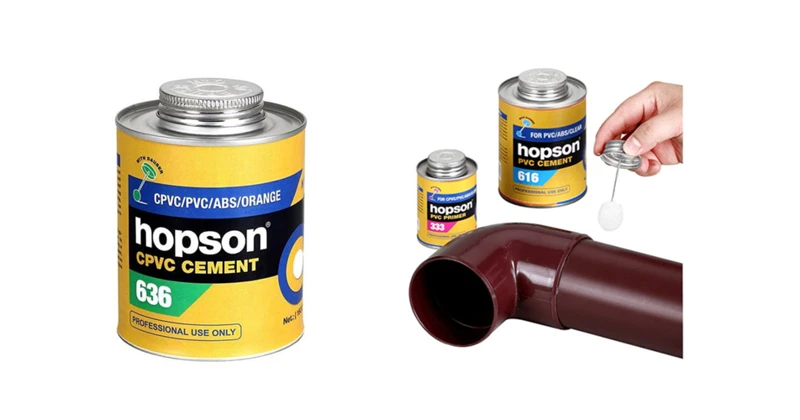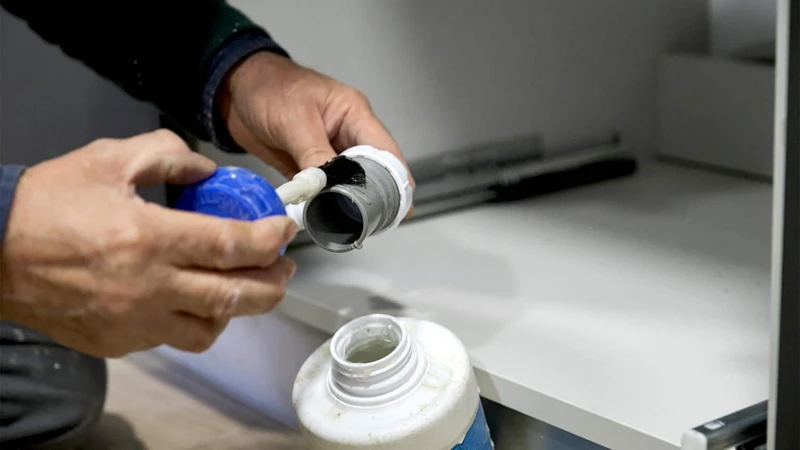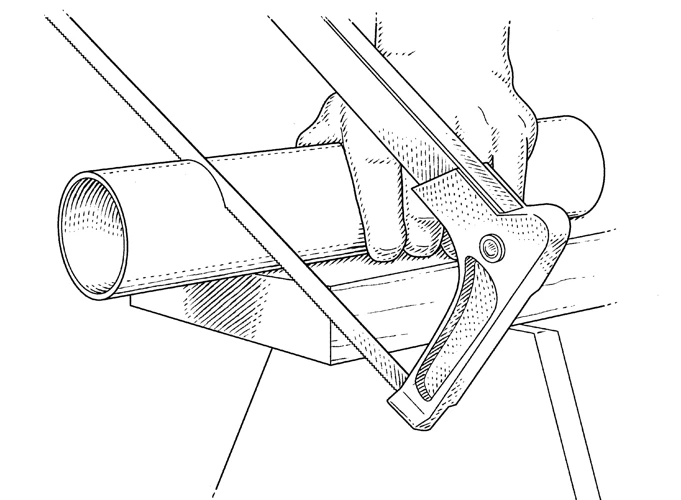Introduction: PVC Glue 101
PVC Glue 101: Understanding the Basics
PVC glue is a type of adhesive used to bond Polyvinyl Chloride (PVC) pipes and fittings. It is a popular choice for plumbing and DIY projects due to its excellent bonding strength, durability, and versatility. PVC glue is also known as PVC cement or PVC solvent, and it is available in various types and formulations to suit different applications.
Using the right type of PVC glue is crucial for achieving a tight and long-lasting bond between PVC parts, whether they are used for water supply, drainage, or other applications. But before we dive into the different types and uses of PVC glue, let’s first understand what it is, its composition, and its key properties and benefits.
Knowing the basics of PVC glue will help you choose the right product for your needs, prepare the surfaces correctly, apply the glue effectively, and ensure safe handling and disposal. Whether you are a professional plumber, an avid DIYer, or a homeowner looking to fix a leaky PVC joint, this guide will provide you with valuable information and tips on PVC glue.
What is PVC Glue?
PVC glue, also known as Polyvinyl Chloride glue, is a type of adhesive that is widely used for plumbing and DIY projects. It is essential to understand the basic composition and properties of PVC glue, as well as its various types and applications to make the most out of this versatile adhesive. In this section, we will delve deeper into the definition of PVC glue and explore its unique characteristics that make it a reliable option compared to other adhesives. So, let’s dive in and uncover the wonders of PVC glue!
Definition and Composition
Definition and Composition:
PVC glue, also known as PVC adhesive, is a type of adhesive that is used to bond PVC (polyvinyl chloride) materials. PVC glue is made up of a combination of solvents and PVC resin. The solvents contained in the glue act as a carrier for the PVC resin, which when applied to a PVC material surface, creates a strong bond. The chemical composition of PVC glue varies, depending on the specific type of PVC glue.
PVC glue is commonly used in a variety of industries including plumbing, construction, automotive, and marine. In plumbing, PVC glue is used to bond PVC pipes and fittings together to create a seal that is both water and airtight.
It’s important to note that PVC glue is different from other types of adhesives, such as epoxy adhesive or super glue. Epoxy adhesives typically consist of two parts that are mixed together, while super glue is a cyanoacrylate adhesive that cures when exposed to moisture. PVC glue is specifically designed to bond PVC materials and should not be used on other surfaces.
If you want to learn more about what kind of glue to use on FRP panels, check our detailed guide.
Key Properties and Benefits
PVC glue has several key properties and benefits that make it a go-to adhesive for many DIY projects and plumbing repairs.
Water Resistance: One of the primary benefits of PVC glue is its strong water resistance. Once dry, the adhesive creates a secure and watertight bond, making it ideal for plumbing repairs and ensuring long-lasting results.
Drying Time: PVC glue also dries relatively quickly, typically within 15 minutes to an hour, depending on the product and conditions. It is important to note that the drying time can be impacted by factors such as temperature and humidity.
Strength: PVC glue is known for its strength and durability, providing a strong bond that can withstand pressure and stress. It bonds both rigid and flexible PVC materials, making it incredibly versatile.
Chemical Resistance: PVC glue is highly resistant to chemicals, making it ideal for use in plumbing systems where exposure to corrosive materials is possible.
Easy to Use: PVC glue is also relatively easy to use, often available in convenient squeeze bottles or cans with applicator brushes. With the right preparation and application techniques, even beginners can achieve a strong bond.
Versatility: Another advantage of PVC glue is its versatility in bonding different materials. It can bond PVC to various surfaces such as metal, wood, and concrete, making it a popular choice for a range of DIY projects.
PVC glue is a reliable and versatile adhesive with several key properties and benefits that make it well-suited for a variety of applications. Whether you are working on a plumbing repair, crafting project, or any other DIY project, PVC glue could be the perfect adhesive for you to use.
If you are interested in learning more about how to use PVC glue, check out our article on how to glue PVC.
Types of PVC Glue
When it comes to PVC glue, there are several types available on the market. Each type has its own specific set of properties that make it suitable for different applications. Whether you are working on plumbing or DIY projects, it is important to choose the right type of PVC glue to ensure a secure and long-lasting bond. In this section, we will explore the different types of PVC glue and their unique features.
Solvent Cement
Solvent cement, also known as PVC pipe glue or PVC cement, is the most common type of PVC glue used in plumbing and construction projects. This type of glue is specially formulated to bond PVC materials together by dissolving and fusing the plastic. The resulting joint is strong, durable, and water-resistant.
Here are some key features of solvent cement:
- It is a fast-drying adhesive that forms a watertight seal within seconds.
- It is easy to apply with a brush or dauber, which makes it ideal for both professional and DIY projects.
- It can be used for both pressure and non-pressure applications.
- It is available in different formulations, including regular, medium, and heavy-bodied cement.
- It is compatible with most types of PVC materials, including pipes, fittings, and valves.
To use solvent cement, it is important to follow some best practices:
- Make sure the surfaces to be bonded are clean, dry, and free of any dust, debris, or grease.
- Apply a thin layer of glue to both surfaces using a brush or dauber, taking care not to apply too much pressure.
- Join the two surfaces together and hold them firmly for at least 30 seconds to allow the glue to dry.
- Wipe away any excess glue using a clean rag and allow the joint to dry for at least 15 minutes before handling it.
One of the advantages of solvent cement is its versatility. It can be used to bond not only PVC materials but also other types of plastics, such as ABS and acrylic. However, it is important to use the appropriate type of glue for each type of plastic to ensure a strong and durable bond. For example, while PVC glue can bond PVC to ABS, it is not recommended to use it to bond acrylic to PVC. For that, you might want to try a specialized adhesive for acrylic.
Solvent cement can also be used to repair damaged PVC pipes or fittings. If a joint has become loose or has started leaking, you can apply a fresh layer of solvent cement to the joint to fix the problem, as long as the pipe is not broken or cracked. You can find more information about re-gluing PVC pipe in our related article.
Solvent cement is a reliable and effective adhesive that is widely used in plumbing, construction, and DIY projects. It is important to follow the manufacturer’s instructions and use appropriate safety measures when working with PVC glue, as it contains volatile organic compounds (VOCs) that can be harmful if inhaled or ingested. Keep in mind that the drying time of PVC glue might vary based on factors such as temperature and humidity, so it’s advisable to wait at least a few hours before putting any pressure on the joint. You can find more information about how long PVC glue takes to dry in our related article.
Two-Part Epoxy
Two-Part Epoxy: Two-part epoxy PVC glue is a highly durable adhesive that creates a strong, permanent bond between PVC materials. It is available in liquid or paste form and consists of a resin and hardener, which are mixed together just before application.
| Advantages | Disadvantages |
|---|---|
| The strong bond created by epoxy PVC glue is long-lasting and durable, making it ideal for use in applications that require a high level of strength and resistance to wear and tear. | The application process for epoxy PVC glue is more complex than other types of PVC glue, requiring careful mixing and application of the resin and hardener. |
| Epoxy PVC glue can be used on a variety of surfaces, including metal, plastic, wood, and concrete, giving it a wide range of potential applications. | The curing time for epoxy PVC glue is longer than other types of PVC glue, taking up to 24 hours to reach full strength. |
| The adhesive properties of two-part epoxy PVC glue remain strong even in extreme temperatures and harsh environments. | Epoxy PVC glue can be more expensive than other types of PVC glue, due to its advanced formulation and increased strength. |
When using two-part epoxy PVC glue, it is important to follow the manufacturer’s instructions carefully to ensure a proper bond. It is also important to use the appropriate safety gear, such as gloves and eye protection, as the chemicals in the adhesive can be harmful if they come into contact with the skin or eyes.
While not as commonly used as other types of PVC glue, two-part epoxy PVC glue is an excellent choice for projects that require a strong, permanent bond between PVC materials. It can be used for a variety of applications, including automotive repairs, plumbing projects, and even crafting projects. To learn more about other types of PVC glue and their specific applications, check out our article on what is the best glue for refrigerator plastic?
Multipurpose Adhesive
Multipurpose adhesive is a fantastic option for those who are unsure about the type of PVC glue they need for their project. This glue can be used on PVC pipes, fittings, and other materials with ease, making it a versatile option for all kinds of applications. What makes multipurpose adhesive stand out from other types of PVC glue is its ability to bond with different kinds of materials. It can be used on a variety of surfaces like metal, wood, plastic, and TPU, making it an excellent choice for those who want a reliable adhesive for their DIY projects.
One of the prominent advantages of multipurpose adhesive is its strong bond. It creates a permanent bond that can withstand high levels of stress and strains. This adhesive works by softening the surface of PVC material and then fusing it together when the solvent evaporates. This process creates a strong molecular bond between the materials, ensuring a durable and long-lasting bond.
However, it is important to note that not all multipurpose adhesives are made equal. The effectiveness of this adhesive often depends on the type of materials you are working with. For example, if you’re working with TPU, a specific type of glue might be required. You may need to check on how to glue TPU before starting your DIY project.
Another point to keep in mind is that multipurpose adhesive works best when used in a well-ventilated area. This is because the adhesive contains strong chemicals that can cause respiratory issues if inhaled in large quantities. It is also essential to wear appropriate protective gear like gloves and goggles when working with this adhesive.
To sum up, multipurpose adhesive is an excellent choice if you want a versatile adhesive that can bond with multiple surfaces. Its strong bond and easy application make it a popular choice for DIY projects and professional applications alike. However, it’s essential to exercise caution while working with this adhesive and follow the necessary safety procedures. If you need to bond specific materials like PEX pipes, consider reading what glue to use on PEX pipe for a better understanding on your adhesive choice.
How does PVC Glue Work?
When working on plumbing or DIY projects, it’s essential to understand how PVC glue works. This type of adhesive is a go-to for bonding PVC pipes and fittings, creating a solid seal that can withstand pressure and moisture. In this section, we’ll delve into the chemical process behind PVC glue, factors that affect its performance, and its various uses in plumbing and DIY projects. Additionally, we’ll share some best practices for using it effectively and safely. So, let’s dive in!
Chemical Process and Reaction
The chemical process and reaction of PVC glue is a critical aspect to understand when working with this adhesive. PVC glue is a solvent cement that works by chemically melting the surface of the PVC material, allowing it to fuse together and create a solid bond.
Composition: PVC glue is composed of a mixture of solvents, in which a small amount of PVC resin is dissolved. The most common solvents used in PVC glue are tetrahydrofuran, cyclohexanone, and methyl ethyl ketone. These solvents are what allow the glue to chemically melt the surface of the PVC material it is applied to, creating a strong bond.
Reaction: When PVC glue is applied to two pieces of PVC material, the solvents in the glue begin to dissolve the surface of the material, creating a melted layer. As the solvents evaporate, the PVC resin left behind in the glue hardens, solidifying the bond between the two pieces of material. This process is known as solvent welding.
It is important to note that the chemical reaction of PVC glue is influenced by several factors. The temperature and humidity of the environment can affect how quickly the solvents evaporate and the glue hardens. The thickness of the glue layer, as well as the pressure applied to the materials while the glue dries, can also impact the strength of the final bond.
In terms of safety precautions, it is essential to follow the manufacturer’s instructions and wear proper protective gear such as gloves and safety glasses when working with PVC glue. Additionally, it is essential to use PVC glue in a well-ventilated area to prevent inhalation of harmful fumes.
Internal link: For more information on what glue to use on tires, check out our article “What Glue to Use on Tires”. Or, if you’re wondering how to glue PVC conduit, check out our article “How to Glue PVC Conduit”.
Factors Affecting Performance
The performance of PVC glue is influenced by several factors, including humidity, temperature, surface preparation, and joint design. Here is a breakdown of each factor and how it affects the bonding of PVC.
| Factor | Why it matters | How it affects bonding |
|---|---|---|
| Humidity | Moisture can interfere with the chemical reaction that occurs when the glue is applied to the PVC surfaces. | High humidity levels can slow down the curing process, leading to weaker bonds. |
| Temperature | The glue’s curing speed and strength can vary depending on the temperature of the surrounding environment. | Excessive heat can cause the solvent to evaporate too quickly, leading to incomplete curing and weaker bonds. Similarly, low temperatures can slow down the curing process, leading to insufficient bonding. |
| Surface Preparation | Clean and dry surfaces provide better bonding opportunities, while dirty or wet surfaces can interfere with the bonding process. | Inadequate cleaning of the PVC surface can create barriers that prevent proper bonding. Applying glue to a wet surface can dilute the glue and prevent proper curing. |
| Joint Design | The shape and size of the joints being bonded can influence the type of glue and amount needed for best results. | Improper joint design can lead to glue wicking out of the joint or pulling away from the surface, leading to weaker bonds. It is important to choose an appropriate glue and apply it correctly to ensure good bonding. |
It is essential to take these factors into account before working with PVC glue. Factors such as humidity and temperature can compromise the adhesive’s strength, making it essential to work under suitable conditions. Proper surface preparation can ensure clean and dry surfaces that bond effectively, and a well-designed joint can prevent glue from seeping out or pulling away from the surface. By understanding how these factors impact PVC glue’s bonding performance, you can ensure that your adhesive produces the desired results.
Uses in Plumbing and DIY Projects
Uses of PVC Glue in Plumbing and DIY Projects
PVC glue is widely used in varying plumbing and DIY projects due to its strong bonding capacity, versatility, and flexibility. Here are some of its common applications:
| Usage | Description |
|---|---|
| PVC Pipe Repairs | PVC glue is ideal for repairing and joining split or cracked PVC pipes. With its strong bonding capacity, it provides lasting durability to the pipes. |
| Fitting and Joint Connections | For ensuring secure and permanent connections between PVC fittings, solvent cement is used in combination with PVC primer to provide excellent bonding strength to the joints. |
| DIY Home Improvements | From making PVC window frames to creating PVC outdoor furniture, PVC glue provides a versatile adhesive solution for a range of DIY home improvements. It is suitable for bonding PVC to various materials, including wood, metal, glass, and more. |
| Swimming pool maintenance | PVC glue is often used to join the PVC pipes and fittings that circulate water in swimming pools and other water features. The bonding strength makes it resistant to leaks, ensuring that there is minimal water loss as the pool is in operation. |
As seen from the above table, PVC glue is extensively used in plumbing installations, DIY projects, and swimming pool maintenance. Its flexible and robust nature ensures that it can be used with a wide variety of materials, making it an excellent adhesive solution for various applications.
Best Practices for Using PVC Glue
When it comes to using PVC glue, there are several best practices that one should keep in mind. These will not only ensure that the adhesive performs optimally but also guarantee personal safety during the application process. From preparation to application, following these guidelines will result in a successful project and a reliable bond. Let’s take a closer look at what actions and safety measures are necessary for the best results.
Preparation and Safety Measures
Before using PVC glue, it is essential to follow some necessary preparation and safety measures. These measures are important to ensure the adhesive’s proper bonding and protect yourself from any accidents or injuries.
Preparation Measures
The preparation measures for using PVC glue are as follows:
| Preparation Measure | Description |
|---|---|
| Clean the Surface | Before applying PVC glue, ensure that the surface you are about to join is clean, dry, and free from any debris, dust, oil, or grease. Use a clean cloth or sandpaper to remove any dirt or contaminants. |
| Make Sure the Parts Fit | The parts that you intend to join should fit snugly together. Test-fit the parts before applying the adhesive to see if they match correctly. |
| Apply Primer | For best results, apply a primer to the surface to be bonded. The primer helps to improve bonding and ensures that the adhesive penetrates and bonds securely to the surface. |
Safety Measures
PVC glue can be hazardous if not handled properly. It is essential to follow some safety measures to prevent any accidents. Some of the safety measures are as follows:
| Safety Measure | Description |
|---|---|
| Use in a Well-Ventilated Area | PVC glue releases fumes that can be hazardous to your health. Use PVC glue only in a well-ventilated area, wear a mask, and avoid inhaling the fumes. |
| Wear Protective Gear | Wear protective gloves to protect your skin from the glue. Wear safety goggles to protect your eyes from the adhesive’s fumes and splashes. |
| Keep the Glue Away from Children and Pets | PVC glue should be kept away from the reach of children and pets. Store the adhesive in a safe place inaccessible to children and pets. |
By following these preparation and safety measures, you will be able to use PVC glue safely and effectively and achieve a strong and reliable bond between the parts that you intend to join.
Application Techniques and Tips
When it comes to applying PVC glue, there are some essential tips and techniques that can help you get better results. Here are some of the key considerations to keep in mind:
| Tip | Description |
|---|---|
| Clean and dry the surfaces | Before applying the PVC glue, make sure the surfaces to be joined are clean and dry. Any dirt, dust, or moisture can affect the strength of the bond. |
| Apply the glue sparingly | You don’t need to use a lot of PVC glue to get a strong bond. In fact, applying too much can lead to messy overflow and weaken the joint. A thin layer of glue on both surfaces is usually sufficient. |
| Apply pressure | Once you’ve applied the PVC glue, press the surfaces firmly together for several seconds. This will help ensure a secure bond and prevent any gaps from forming. |
| Use a primer | In some cases, using a PVC primer can help improve the performance of the glue. The primer helps soften the surfaces and prepares them for bonding. Note that not all types of PVC glue require a primer, so be sure to read the instructions carefully. |
| Keep a damp cloth handy | PVC glue can dry quickly, so it’s important to have a damp cloth nearby to clean up any spills or excess glue before it hardens. |
| Allow time to cure | After you’ve applied the PVC glue, give it plenty of time to cure before putting any stress on the joint. The curing time can vary depending on the type of glue and the conditions, so check the instructions for specific guidance. |
By following these tips, you can ensure that you get a strong and durable bond when using PVC glue. Remember to read the instructions carefully and use the appropriate safety gear, such as gloves and eye protection, when handling the glue. With some practice, you’ll be able to master the techniques for applying PVC glue and use it confidently in your plumbing and DIY projects.
PVC Glue vs Other Adhesives
Choosing the right adhesive is crucial for the success of any project, especially when working with plastics. In the world of adhesives, PVC glue is a popular choice for bonding PVC pipes and sheets. However, it is essential to understand how PVC glue compares to other commonly used adhesives, namely ABS glue, CPVC glue, and PVC cement. Each adhesive has its unique features that make it suitable for specific applications. In this section, we’ll explore the differences between PVC glue and other adhesives, considering their advantages and disadvantages.
Comparison with ABS Glue, CPVC Glue, and PVC Cement
When it comes to choosing an adhesive for your DIY or plumbing project, you may come across various options other than PVC glue. Here is a comparison of some common adhesives used for bonding plastic materials.
ABS Glue: ABS (Acrylonitrile Butadiene Styrene) glue is specifically designed for bonding ABS pipes and fittings. While both PVC glue and ABS glue are solvent-based adhesives, they cannot be interchanged as they have different chemical compositions and curing times. ABS glue is also known to be more tolerant of cold temperatures than PVC glue.
CPVC Glue: CPVC (Chlorinated Polyvinyl Chloride) glue is designed for use with CPVC pipes and fittings, which are often used in hot water systems. CPVC glue has a higher temperature rating than PVC glue and is also more resistant to chemicals. However, it is important to note that CPVC glue should never be used with PVC pipes and fittings.
PVC Cement: PVC cement and PVC glue are often used interchangeably, but there are some differences between the two. PVC cement is a type of PVC glue that is specifically designed for bonding PVC pipes and fittings under pressure. While PVC glue can be used for non-pressurized applications, PVC cement is necessary for applications that involve water supply or drainage systems.
In general, PVC glue is a versatile adhesive that can be used for various plastic materials and applications, but it is important to choose the correct adhesive for your specific needs and materials. Always follow the manufacturer’s instructions and safety measures when using any adhesive.
Advantages and Disadvantages
When considering PVC glue as an adhesive option, it is important to weigh its advantages and disadvantages. Here are a few of each:
Advantages:
- Water-resistant: PVC glue creates a strong bond that is resistant to water, making it an ideal choice for plumbing projects.
- Quick-drying: This type of glue dries relatively quickly, allowing for efficient project completion.
- Easy to use: With proper preparation and technique, PVC glue can be applied easily even by those with limited DIY experience.
- Cost-effective: Compared to other adhesives, PVC glue is generally quite affordable and widely available.
Disadvantages:
- Strong odor: The solvents used in PVC glue can produce a strong odor during application, which can be unpleasant for some individuals.
- Not suitable for all materials: While PVC glue is highly effective when bonding PVC materials, it may not work well on other types of plastic or surfaces like metal or wood.
- Limited repositioning: Once PVC glue has set, it is difficult to reposition the pieces being bonded. This means that it may not be the best choice for projects that require a lot of adjustment during assembly.
- Can cause damage if misused: As with any chemical product, PVC glue must be used with caution and according to instructions, as misuse can result in damage or injury.
In weighing these factors, it is important to consider the specifics of your project and determine whether PVC glue is the most appropriate adhesive choice. However, for many DIY and plumbing applications, PVC glue can be a reliable and cost-effective option.
Conclusion: PVC Glue as a Reliable and Versatile Adhesive
It’s safe to say that PVC glue is a reliable and versatile adhesive that is commonly used in plumbing and DIY projects. With its strong bonding properties, it can effectively join PVC pipes and fittings together, creating a leak-free fit that can withstand pressure and extreme temperatures.
One of the key benefits of PVC glue is its affordability and accessibility. Being readily available in most hardware stores, it’s a popular choice for many DIY enthusiasts and professionals alike. Additionally, PVC glue has a quick-setting time, allowing users to complete their projects in a timely manner.
However, it’s important to note that proper preparation and application techniques are necessary for achieving the best results. Adhering to the safety measures and ensuring that all surfaces are clean and dry before application can prevent potential accidents and ensure a strong and durable bond.
When compared with other types of adhesives like ABS glue, CPVC glue, and PVC cement, PVC glue stands out for its versatility and ability to bond with a wide variety of PVC materials. Additionally, PVC glue has a lower chance of damaging the PVC material and is less prone to discoloration over time.
In summary, PVC glue is a cost-effective, easy-to-use adhesive that can deliver exceptional results when used correctly. With its wide availability and range of applications, it’s a must-have for any DIYer or professional seeking a reliable and versatile adhesive.
Frequently Asked Questions
What temperature range can PVC glue withstand?
PVC glue can withstand temperatures from -20 to 200°F (-29 to 93°C).
Can PVC glue be used on other types of plastic besides PVC?
No, PVC glue is specifically designed for PVC materials and may not bond properly with other plastic types.
How long does it take for PVC glue to fully cure?
It usually takes around two hours for PVC glue to fully cure, but this can vary depending on factors such as temperature and humidity.
What safety precautions should be taken when using PVC glue?
It’s important to wear gloves and eye protection when using PVC glue, as well as working in a well-ventilated area to avoid inhaling fumes.
Can PVC glue be used on wet surfaces?
No, PVC glue needs a dry and clean surface to properly bond with PVC material.
What is the shelf life of PVC glue?
PVC glue has a shelf life of approximately two years when stored in a cool, dry place.
What is the best way to store PVC glue?
PVC glue should be stored in a cool, dry place with the cap tightly sealed to prevent drying out.
Can PVC glue be used to repair broken PVC pipes?
Yes, PVC glue is commonly used for repairing PVC pipes.
What is the difference between PVC glue and PVC cement?
PVC glue and PVC cement are essentially the same product. The terms are often used interchangeably.
Does PVC glue have any odor?
Yes, PVC glue has a distinctive odor due to the solvents used in its composition. It’s important to work in a well-ventilated area to avoid inhaling fumes.
